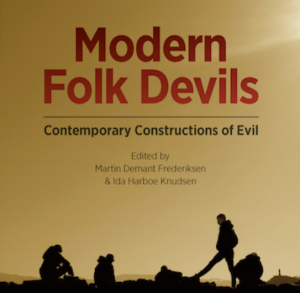
Vyšla kniha Modern Folk Devils, Contemporary Constructions of Evil s kapitolami Ondřeje Slačálka o anticiganismu a Evy Svatoňové o antifeminismu. Knihu si lze celou stáhnout v režimu open access na stránkách vydavatele. Gratulujeme.
The devilish has long been integral to myths, legends, and folklore, firmly located in the relationships between good and evil, and selves and others. But how are ideas of evil constructed in current times and framed by contemporary social discourses? Modern Folk Devils builds on and works with Stanley Cohen’s theory on folk devils and moral panics to discuss the constructions of evil. The authors present an array of case-studies that illustrate how the notion of folk devils nowadays comes into play and animates ideas of otherness and evil throughout the world. Examining current fears and perceived threats, this volume investigates and analyzes how and why these devils are constructed. The chapters discuss how the devilish may take on many different forms: sometimes they exist only as a potential threat, other times they are a single individual or phenomenon or a visible group, such as refugees, technocrats, Roma, hipsters, LGBT groups, and rightwing politicians. Folk devils themselves are also given a voice to offer an essential complementary perspective on how panics become exaggerated, facts distorted, and problems acutely angled.
Bringing together researchers from anthropology, sociology, political studies, ethnology, and criminology, the contributions examine cases from across the world spanning from Europe to Asia and Oceania.
Martin Demant Frederiksen is an Associate Professor of Anthropology at the Department of Culture and Society, Aarhus University. He works in the interface of anthropology and contemporary archaeology, focusing on emptiness, temporality and coastal infrastructures in Croatia and Denmark, and on subcultures and urbanization in Georgia.
Ida Harboe Knudsen is a social anthropologist, who received her PhD from the Max Planck Institute for Social Anthropology in Halle/Saale Germany. Her research is focused on rural development in Lithuania after the EU-membership and on Lithuanian inmates in Danish prison facilities.